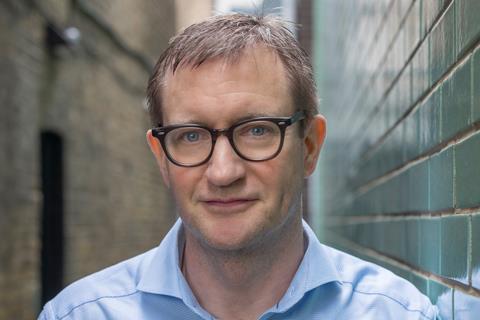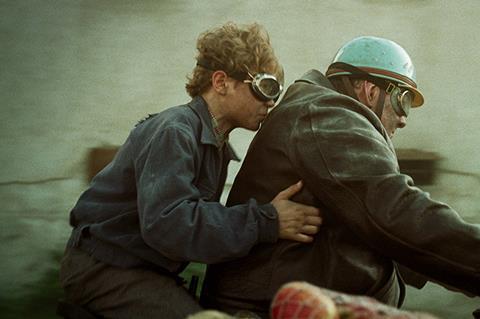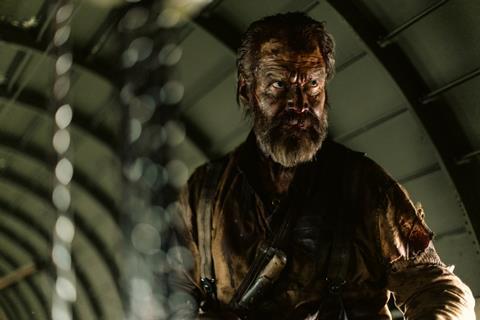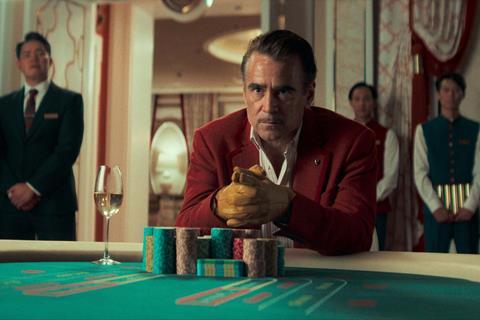Five years after launching Good Chaos, the UK producer has ‘Orphan’ and ‘Ballad Of A Small Player’ set for launch at the fall festivals and a first-look deal with Searchlight.

As the sun streams through a Prague window in the late afternoon haze of a mid-August day, golden rays cascade on the head of Good Chaos founder and producer Mike Goodridge whose unconventional career may be about to enter its magic hour.
Or it could just be a trick of the light, perhaps even the result of a dusty laptop screen. Independent film producing is notoriously difficult and producers rarely have time or inclination to bask in their success.
And Goodridge is busy. He is on the other line, talking about the arrangements for the next few months. He has produced two major international films premiering at the autumn festivals: Hungarian director Lazlo Nemes’ Orphan which premieres today (August 28) in competition at Venice and, just a day later, German filmmaker Edward Berger’s Ballad Of A Small Player in Telluride. Goodridge is trying to work out how to cross an ocean to attend two premieres in two days.

The Hungarian-language Orphan is the third film from the Bafta-winning and Oscar-nominated Son Of Saul director Nemes. Set in Budapest in 1957, it follows a young Jewish boy raised by his mother whose world turns upside down when a stranger appears on his doorstep claiming to be the father he thought had died in the Nazi concentration camps.
Goodridge produced the film with Ildiko Kemeny and Ferenc Szale of Hungary’s Pioneer Productions, with Gregory Jankilevitsch and Klaudia Smieja-Rostworowska of Cyprus-based producer-financier Mid March Media and Alexander Rodnyansky of the now Los Angeles and Tel Aviv-based AR Content. Charades and New Europe Film Sales are handling sales, with Mubi taking rights in various territories including the UK and Ireland.
Ballad Of A Small Player is the seventh feature from the multi award-winning Berger following films including All My Loving, All Quiet On The Western Front and Conclave. It is a Good Chaos co-production with Berger’s Berlin-based Nine Hours and Matthew Wilkinson’s UK outfit Stigma Films, backed by Netflix.
Orphan and Ballad may go on to be players in the upcoming awards season, as might Shih-Ching Tsou’s Taipei-set Left-Handed Girl, the film Goodridge co-produced with Sean Baker and Tsou that debuted in Critics’ Week at Cannes in May and has been selected by Taiwan as its Oscar entry.
He is also looking ahead to the worldwide release of Finnish director Jalmari Helander’s action title Sisu 2: Road To Revenge by Sony Pictures Releasing in November.
But on this sun-bathed afternoon, Goodridge is about to head to the Prague set of The Face Of Horror for a night shoot. The medieval ghost story is being directed by US rising genre star Anna Biller.
With credits including Ruben Ostlund’s Palme d’Or winner Triangle Of Sadness, Baltasar Kormakur’s Touch, Sandhya Suri’s Santosh, Jasmila Zbanic’s Quo Vadis, Aida?, Kirill Serebrennikov’s Tchaikovsky’s Wife and Jessica Hausner’s Club Zero, it is a jolt to remember Goodridge has only been producing for five years.
Is the life of an indie film producer everything he thought it would be? He takes a breath. “You know, you develop and develop and develop, or you wait for opportunities to come to you, but you can never quite plan for what’s going to happen. It was not my ideal to have three films going last year, which we did with Ballad, Orphan and Sisu. But when they come together, they come together, and you can’t stop them.
“Next year, there are 10 things that might happen or nothing could happen, which is very hard when you’re running a company,” he continues. “You need to have some sort of sense of what your what your incomings are going to be. The problem with producing is you only get paid when the film goes into production.”
“Why don’t I put my money where my mouth is?”
Goodridge had already lived three different lifetimes in the international film business before he started his London-based production company Good Chaos during the pandemic in 2020.
He began as a film trade journalist in the early 1990s at the Business Of Film, and then as the London-based features editor at Screen International when it was a weekly print newspaper. He moved to Los Angeles to become Screen’s US editor where he also had a few years as vice president of the Hollywood Foreign Press Association before returning to London to edit Screen in 2010 for two years.
“And then this Protagonist offer came out of the blue,” he says of the chance he took to become CEO of the London-based sales company in 2012. “They were looking for somebody slightly off-centre and I thought, ‘Why not? Why don’t I put my money where my mouth is and see if I can perform in a business world?’”

After five years, he left to become festival director of the then-nascent Macau International Film Festival. “Macau was a wonderful opportunity. I think we created something amazing, but then Covid came in, and that all went away. They never did that festival again after 2020 and I had to decide, ‘Am I going to be an independent producer?’ Because that’s a scary road to go down.”
But working with the producers and directors who had long thrilled him, in a role that would draw on his enjoyment of international festivals and put into play his vast network of contacts, crafted from an almost superhuman ability to schmooze, is surely the job Goodridge was born to do.
Or had he thought at each stage he would be a journalist or a sales executive or a festival head forever? “I wish I had more of a kind of direction,” he says now. “No, I was a really committed trade journalist. But I also realised you amass so much knowledge as a trade journalist, it’s almost like you haven’t got anywhere to go with it after a while.
“I’m not talking about you,” he adds hastily. “I’m talking about my own experience. I wanted to use it in different ways, all these contacts, all this experience, all this exposure that you get. I wanted to use it in different ways to see if I could. And I think I did well at Protagonist in terms of building a slate of projects and working with some amazing filmmakers. And then of course, you start to think, ‘Well, can I produce?’”
Presumably with that contacts book, he hit the ground running? He says not.
“What I find is that people try to pigeonhole you in this business. When I went to Protagonist, it’s like, ‘What does he know about being a sales agent? He’s a journalist.’ When I left Protagonist, they’re like, ‘What does he know about being a festival director? He’s a sales agent.’ I’m like, ‘I wasn’t a sales agent five years ago.’
“Even now in this production lark, I think there is still a bit of snootiness around: ‘What does he know?’ There’s this assumption I’ve never been on a set before, that I don’t know how to put together budgets or work with heads of department. Well, you learn this stuff as you go along.”
He wanted to get involved in projects at an earlier stage than he was able to at Protagonist. “But of course when you do get involved at an earlier stage, you have to have some cash to option things and pay writers. That sets you a challenge of, ‘Can I raise funding to do this and that? Can I pay for the legal fees?’
“And then you start looking for development funding. None of which is incredibly difficult to do. That sounds arrogant. None of it is rocket science, but it’s… a lot. It’s an awful lot of stuff to achieve for each project. The sheer volume of work on each project is massive. And if you consider then the idea of taking something out to try and get finance and you have to send it to, like, a billion places, it’s exhausting and tough.
“The challenge has been to build up enough momentum that people will say, ‘Oh, it’s coming from Good Chaos. That must be interesting.’ Which is hopefully where we are at this period and hopefully we can expand the company a bit.”
Good Chaos presently has a team of seven, including producer James Bowsher, and a first-look, year-long, renewable deal with Searchlight Pictures. “We’ve got plenty to do with them but nothing is set yet,” says Goodridge. “They are a very busy company.”
What particularly excites him is the “fantastic relationship” Good Chaos has with The Creatives, the consortium of nine European production companies that includes France’s Haut et Court, Belgium’s Lemming Film and Germany’s Komplizen Film. “It’s increasingly part of the fabric of who we are.”
His plan is to hire three or four more people to give Good Chaos the ability to work on multiple productions at the same time.

“There are areas where we know we still need support, like in physical production and in business affairs,” he says. “You’re still kind of speculative as a production company. You’re only as good as the stuff you can get made. But hopefully we bought some time with the films that are coming out this year, Ballad and Orphan and Sisu, and we can move into the next stage with some with some cushion.”
He says being allied with The Creatives has given him the confidence to move forward.
“We’re all independent companies doing our own thing but there is a natural tendency to turn to [each other] and say, ‘Can anybody help with this? Is anyone interested on coming on board with me?’. Which I love because I think producing, it’s not as lonely as directing and ‘lonely’ is the wrong word, but it’s more that you have to be single-minded [as a producer] and if you’ve got partners along the way, it’s so much more palatable.”
And partners who aren’t competitive? “Producers are traditionally very competitive and so it’s taken us a long time and a long period of friendship before we’ve been able to open our books to each other. It’s taken about five years.
“The beauty of being in different territories is that you do have different sources of funding, and you have different languages, and you have different sort of broadcasters, and you have different avenues. It’s a question of seeing what the synergies are. That’s Romain’s next step, working out how we can work together more effectively.”
‘Romain’ is Romain Bessi, the former Newen Studios chief and Studiocanal exec who joined The Creatives as CEO nearly a year ago.
“He is creating this corporate structure whereby we’re much more physically interconnected with the other companies and hopefully we’ll be able to raise money,” Goodridge explains. “That could be our sort of equivalent of an overhead deal down the line.”
He later says “real ownership exchange” is the plan for the group.
Goodridge loves being part of a European group. “We’re the only UK company in that group. In a post-Brexit world, this was a way for me to keep the company European. We’re grateful to be a part of it. We’ve looked more to Europe rather than to America in our content production and in our filmmakers. We’re interested in working with European filmmakers, and we’ve worked with a few Asian filmmakers as well. America has incredible producers and I’m not sure I’d know how to get films made in the US.”
“I was fortuitous to attach Edward Berger”

Macau, however, is a different matter. Ballad Of A Small Player is the first western production to shoot almost entirely in the autonomous coastal region of China, a former Portuguese colony known for the bright, brash lights of its many casinos.
“It’s unusual as a film because it’s very rare to see films that are set in Macau. It’s a kind of sci-fi place,” he says. “It’s an extraordinary place.”
Ballad was the first property Goodridge optioned when he left Protagonist as novelist Lawrence Osbourne was a friend. “When I got the Macau festival job, he said, ‘Why don’t you option my novel?’ I read it and thought it had great potential.
“And then I attached Edward Berger, which was fortuitous,” he says with knowing understatement. “He had just done [Sky series] Patrick Melrose, and I saw a thematic fit with that show. I loved that series. Even more fortuitous is that we managed to keep Edward through this explosion in his career, which happened with All Quiet On The Western Front and now Conclave. His company, Nine Hours, co-produced it with us. It’s been a great experience and I’m very grateful Edward stayed with Ballad Of A Small Player.”
From the beginning Goodridge wanted Colin Farrell to star. “We waited and waited, and Colin eventually committed.”
The film’s early development was funded by the development fund of the UK’s Curzon, Belgium distributor Cineart and Australia’s Madman. “I’m very grateful for them for that,” says Goodridge. “It then evolved into something bigger in a post-All Quiet world… Netflix came in. They have a very close relationship with Ed and Nine Hours.”
“Curation is the purest part of the business”
A new endeavour is as a programme advisor for the Red Sea International Film Festival in Jeddah, reuniting with international programmer Finn Halligan whom he met at Screen and with whom he later worked at Macau.
“I’m interested in that festival and that region,” he says of Red Sea. “I’ve always loved what Shivani Pandya did at Dubai [International Film Festival] and now seeing how she’s built that festival. I programmed at Sarajevo [Film Festival ] for a long time. I programmed at Macau, and I love that part of the business. Curation is the purest, I think. Yes, you have your municipal loyalties to deal with but you’re literally programming as you would a consumer. You’re using your taste.”
When it comes to taste, Goodridge says Good Chaos is making an effort to develop British stories in a unique way. “I’m constantly battling this idea of social realism as a de facto British way of making films,” he says through gritted teeth. “I think foreign countries think [social realism] is our sweet spot. But we should encourage people to be more adventurous in cinematic terms.
“When you think of David Lean or Powell and Pressburger, or Tony Richardson, the world was their oyster,” he enthuses. “They were creating and developing such interesting cinema. I feel we’ve gone a bit flat in the UK. And it’s about trying to get to the truth, for me, personally, and for Good Chaos. It’s about trying to work on things which are less generic.”
It is a work life that must take up a lot of energy, in an industry that is not becoming any easier. Goodridge says he regenerates through napping – “I’m a good napper” – and an absolute determination to think and act positively.
“This business is a resilient business. It will continue,” he says. “But it feels like we’re in a particularly demanding time right now. You have to stay proactive. You have to carry on pushing forward. I mean, that’s what producers do, they push and push and push.”
And with that, the sun is going down and The Face Of Horror set beckons. But production is not generally his favourite part of the job.
“I really love the development process on some things,” he says. “It’s kind of tentative because you never quite know if you’re going to be able to get this thing off the ground. But when you do get an exciting script or you get a script into exciting shape, you think, ‘Oh, my God, I think I can get this made. I think this is good.’
“What I always tried to do at Protagonist is work with exciting directors who I know could get cast, who I knew could get finance. And that’s what I do now, try to put things together which are makeable and that people want to see, rather than try with something impossible from the start.”

























No comments yet